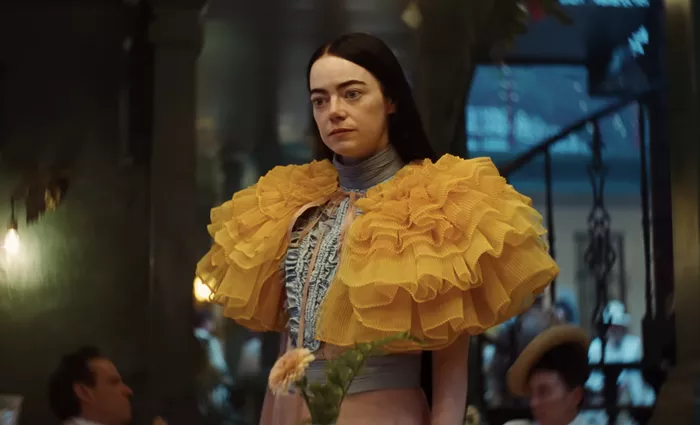Hold on to your wigs, because Yorgos Lanthimos has unleashed another exquisitely mad creation that will leave you spellbound! In his latest tour de force, “Poor Things,” Lanthimos and screenwriter Tony McNamara craft a jewel-toned steampunk universe, fusing Mary Shelley’s “Frankenstein” with a 19th-century bildungsroman and injecting it with a defiantly feminist twist.
The film invites us into a world teeming with eccentricity and pure visual exuberance. Rooted in Lanthimos’ signature audacity, “Poor Things” wholeheartedly embraces bodily fluids, wildly uninhibited sexuality, and a wickedly humorous exploration of self-discovery, degradation, and unabashed pleasure. It’s a demented carnival of emotions that catapults cinema into uncharted territories of sheer creativity and daring.
Set in a Victorian-era wasteland, we meet Bella Baxter, played with undeniable brilliance by the incomparable Emma Stone. Resurrected after her tragic suicide, Bella possesses the body of a woman and the mind of a baby. Under the protection of her creator, Godwin Baxter (played with magnetic intensity by Willem Dafoe), Bella teeters between innocence and a voracious thirst for knowledge about the world around her. When Duncan Wedderburn (the effervescent Mark Ruffalo) enters the scene to draft a marriage contract for Bella, she seizes the opportunity to escape the clutches of her creator and embarks on a transformative journey with Duncan, unearthing the complexities of womanhood along the way.
While the film stumbles slightly at the beginning, plagued by a sluggish pace and an occasionally overacted portrayal from Stone during Bella’s most childlike moments, it deftly finds its footing once Ruffalo bursts onto the screen and the transition from black-and-white to vivid color takes place. From that moment, “Poor Things” soars to new heights, unleashing an unrelenting stream of visual splendor and captivating performances.
Emma Stone is an absolute revelation as Bella. Embodying the essence of a Victorian Wednesday Addams, she radiates an insatiable hunger for experiences that range from intellectual enlightenment to scandalous liaisons. Stone unravels Bella’s journey of self-discovery with a blissful fearlessness, abandoning any trace of vanity and striking a perfect balance between deadpan wit and outrageous humor. Bella’s unapologetic pursuit of her desires makes her a magnetic force on the screen, and Stone revels in every audacious decision.
Matching Stone’s extraordinary performance, Mark Ruffalo delivers a mesmerizing turn as Duncan Wedderburn. Liberated from his usual role as the virtuous everyman, Ruffalo throws himself into portraying a debaucherous cad, relishing in the character’s self-centeredness and lustful pursuits. With a haughty demeanor and an accent that oozes pretentiousness, Ruffalo masterfully creates a larger-than-life, blithering wreck of a man. His scenes with Ramy Youssef, who portrays the calm and gentle Max McCandles, provide a delightful contrast that further elevates the film’s comedic prowess.
“Poor Things” revels in its audacious and absurd nature, but beneath the laughter and explicit scenes lies a profound heart. Lanthimos’ most earnest and romantic film to date, it wholeheartedly embraces and celebrates Bella’s journey towards self-acceptance and love—unfazed by societal expectations and constraints. The visually enchanting world serves as the perfect backdrop, featuring cotton candy skies of pink and purple and lavish, otherworldly sets that accentuate the larger-than-life narrative. Occasional formal choices, such as the frequent use of fisheye lenses, may come across as excessive, but in the grand scheme of things, it’s a minor quibble.
Beyond its captivating blend of hilarity, explicit sensuality, and imaginative dialogue, “Poor Things” emerges as a romance that celebrates a woman’s ability to wholeheartedly embrace her true self, defying societal norms and expectations. Bella stands as a timeless cinematic heroine, unapologetically pursuing her desires and carving her own path amidst a world that seeks to confine her. Through Lanthimos’ lens, we are reminded that cinema can be a portal to realms we never knew existed. For that reason, “Poor Things” is not merely a film; it’s an extraordinary work of art.
Prepare to be captivated and thoroughly entertained when “Poor Things” arrives in theaters on December 8th. Yorgos Lanthimos has once again proven himself as a true master of unconventional storytelling, leaving audiences yearning for more.

